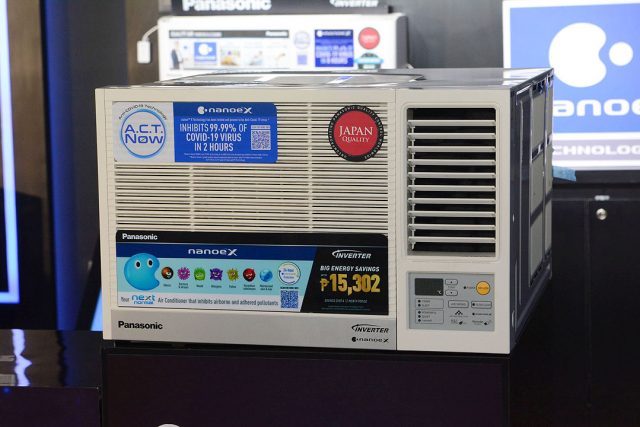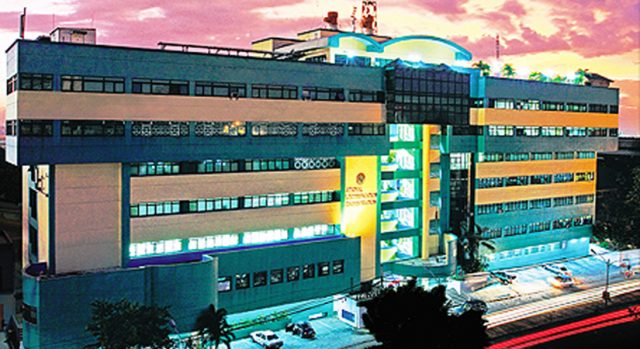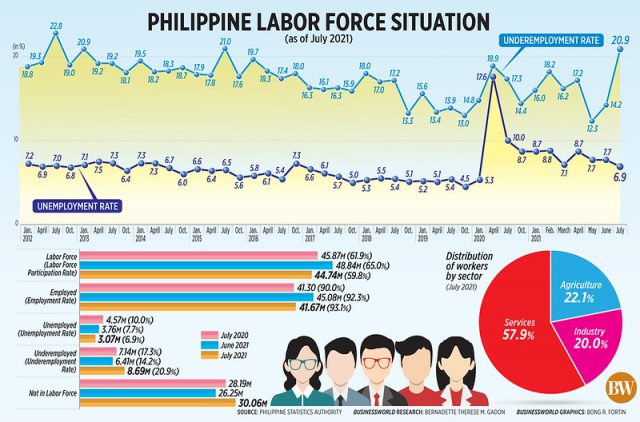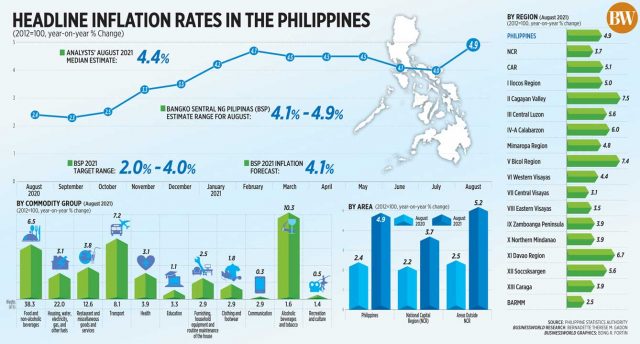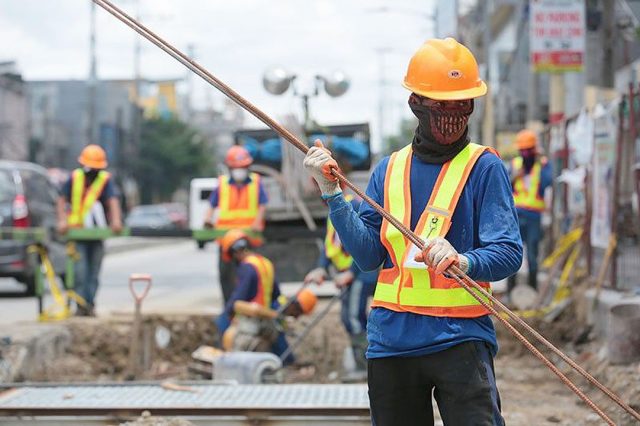PETA offers new cycle online workshops
THE PHILIPPINE Educational Theater Association (PETA), will hold a new cycle of online theater workshops from September to October. Aimed at providing an avenue for learning and creative expression for starters and professionals, PETA’s exclusive online workshops are tailored to meet the demands of adults who are looking for personal artistic development in between their busy work-from-home schedules. Teachers for the upcoming workshop cycles include Meann Espinosa and Kiks Baento for Acting for Beginners (Batch 1 on Sept. 17, 19, 24, 26, Oct 1; Batch 2 on Oct. 8, 10, 15, 17, 22); Jeff Hernandez and Zoe Damag for Creative Musical Theater (Batch 1 on Sept. 17, 19, 24, 26, Oct 1; Batch 2 on Oct. 8, 10, 15, 17, 22); Phil Noble and Ian Segarra for Acting for Screen (Batch 1 on Sept. 17, 19, 24, 26, Oct 1; Batch 2 on Oct. 8, 10, 15, 17, 22); and J-Mee Katanyag for Writing for Performance (Oct. 8, 10, 15, 17, 22). For more information, visit bit.ly/PETAWorkshopOnline or contact Betita Sarmiento via cellphone at 0929-891-9538, or e-mail at betitasarmiento@petatheater.com.
Rep’s The Great Christmas Cookie Bake-off!
REPERTORY Philippines (Rep) will be bringing holiday cheer to every home with the musical The Great Christmas Cookie Bake-off! which marks many firsts. It is the first Rep Theater for Young Audiences (RTYA) offering in over a year. It is also the first-ever Filipino production to be available on streaming platform Broadway On Demand. The musical is also the first in the country that is purposely filmed for an international online streaming service. To be shown from Nov. 12 to Dec. 12, The Great Christmas Cookie Bake-off! combines the time-honored tradition of Christmas cookies with the ever-popular phenomenon of reality baking competitions. It features eight young cookie chefs from all over the country who will battle it out for first prize at the Cookie Coliseum. As the chefs are eliminated one by one by three celebrity judges, feelings of intense rivalry give way to virtues of charity, family, and forgiveness. The show is directed by RTYA Creative Director Joy Virata. The musical’s cast consists of Becca Coates, Tim Pavino, Jep Go, Jillian Itaas, Luigi Quesada, Rachel Coates, Justine Narciso, Steven Hotchkiss, Carla Guevara Laforteza, Jamie Wilson, Arnel Carrion, and Hans Eckstein. Treb Monteras helms the video production. Ticket prices are P700 (Regular) and P1,000 (Family/Household). Each ticket gives 24-hour access to the musical, which can be accessed via computer or mobile device through a web browser or via tablet or smartphone through the Broadway On Demand app on the App Store and Google Play. Broadway On Demand is also available on AppleTV and Roku. For updates, visit www.repertoryphilippines.ph, like and follow Repertory Philippines on Facebook and Instagram. Educators and school representatives who are interested in the show can e-mail sales@repphil.org.
Fundacion Sansó raises funds for Museo Pambata
FUNDACION Sansó, in partnership with Museo Pambata, launched a fundraising event in aid of Manila’s temporarily closed museum — sold two limited-edition giclees by Sansó entitled Golden Bloom and Wandering Dream. Because of the limitations imposed by the ongoing coronavirus disease 2019 (COVID-19) pandemic, Museo Pambata, a top destination for field trips and school tours, became unable to accommodate visitors, resulting in its losing a large portion of its earnings. The fundraiser, Flowers for the Children, started in Nov. 2020. In June this year, Fundacion Sansó officially turned the proceeds over to Museo Pambata via streaming live on their Facebook page.
The Well-Appointed Life auction
SALCEDO Auctions’ annual The Well-Appointed Life auction highlights “Important Philippine Art” and a “Connoisseur Collection.” With the theme “The Worlds We Create,” the sale will take place simultaneously live and online on Sept. 18, 2 p.m., at the NEX Tower sale room. Up for bid are works by some of the country’s old masters and master artisans and rising contemporary artists and international designers. One highlight of the auction is a recently discovered 1900 seascape in oil by Félix Resurrección Hidalgo titled Marina. There is also a 1975 oil painting by National Artist H.R. Ocampo titled Excursion to Pinaglabanan — a tribute to Andres Bonifacio, Emilio Jacinto, and the Katipunan militia’s successful capture of a Spanish military base. Also in the auction is a 1966 oil on wood piece by National Artist Jose Joya titled Blue Harbor. The online catalogue as well as the bid registration and venue of the online auction can be accessed on salcedoauctions.com. For inquiries, e-mail info@salcedoauctions.com, call 8823-0956 or text 0917-107-5581.
Silverlens Art Basel show presents Pacita Abad
SILVERLENS will participate in Art Basel with a show called “Endless Blues” featuring works by the late Filipino-American artist Pacita Abad. There will be a VIP showing on Sept. 21 to 23, followed by a public viewing on Sept. 24 to 26. The presentation will focus on her Endless Blues series from the early 2000s. Produced towards the end of the artist’ s life, these works bring together Abad’s fascination with batik fabric, her love for blues music, and embed the color, energy, and vibrancy of a life on the road in diverse forms of abstraction. Three contemporary artists will be featured alongside the late artist through the Art Basel OVR, all of whom are connected to Abad: Pio Abad, Patricia Perez Eustaquio, and Nicole Coson. London-based Pio Abad, who is Pacita Abad’s nephew, will hold a walk-through of the exhibit Endless Blues on Sept. 23, at 11 a.m. in Basel, and 5 p.m. in Manila and Hong Kong. He will talk about his aunt’s life and share insights on her abstract pieces featured in the Art Basel exhibition. For details, visit www.silverlensgalleries.com, or call 8816-0044, or e-mail info@silverlensgalleries.com.
Alicdan exhibit at Shangri-La mall gallery
AN EXHIBIT of works by Wilfredo Alicdan called “Geometric Mode” is ongoing until Sept. 15 at The Artologist Gallery in Shangri-La Plaza.
Art workshop relieves pandemic stress
HEALTHCARE workers utilized the arts to break away from stress related to the pandemic, as the Tagum City Historical and Cultural Center organized its first Art in the Park, aimed at championing the arts to help deal with mental health concerns in these trying times. An ancillary event of the Center’s National Heroes Day celebration, Art in the Park gathered five nurses who had previously enlisted in the Center’s Art as a Tool for Therapy lecture by its resident artist Victor Augustus Dumaguing. Held at the Tagumpay Nature’s Park on Aug. 27, the one-day event featured a brief lecture and demo by Mr. Dumaguing on the many ways how to create art, specifically self-portraits. Healthcare workers were asked to paint their projection of themselves on the canvas, resulting in a colorful mixture of hues in one grand painting. Prior to the event, all of the participants had little or no background in painting, and their collective output surprised them. Their output will be one of the artworks included in the Center’s participation in the Mindanao Art Fair in October, the annual gathering of the best artists on the island.
PHL-Korea festival goes online
THE PHILIPPINES-KOREA Cultural Exchange Festival for 2021 will be an online event. A highlight of the festival is the We Stand Together Online Concert, which will be held on Sept. 25, 3 p.m. Organized by the Korean embassy and the Korean Cultural Center in the Philippines together with the United Korean Community Association (UKCA) and the National Commission for Culture and the Arts (NCCA), the concert will feature performances by Filipino and Korean artists and can be streamed for free via the Korean Cultural Center (KCC) in the Philippines Facebook and YouTube pages. The concert will also be streamed on the UKCA and NCCA Facebook pages. The festival’s Online Talent Competition is divided into Voice and Dance categories. Filipino participants (solo or group) may enter the voice competition by performing a Korean song, while Korean participants (solo and group) may join the voice category by singing a Filipino song. For the dance category, Filipino and Korean participants (solo or group) may perform any Korean pop, traditional, or cultural song. Submission of entries is until Sept. 11, after which a voting period shall commence from Sept. 13 to 17. The Grand Winner in the Online Talent Competition will take home P50,000, while the Vocal Category and Dance Category winners will get P30,000 each. Winners will be announced at the Online Concert. There will also be a special screening featuring Modern and Contemporary Art all Sundays of September via KCC social media. Follow the KCC on Facebook (https://www.facebook.com/KoreanCulturalCenterPH/) and @kccphil on Instagram and Twitter for more updates about the Embassy and KCC’s events and activities.

